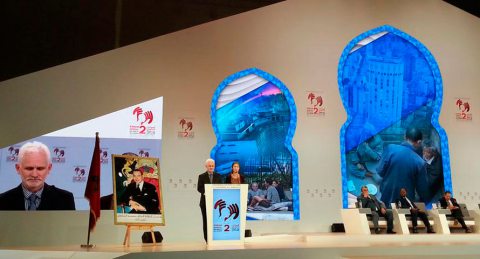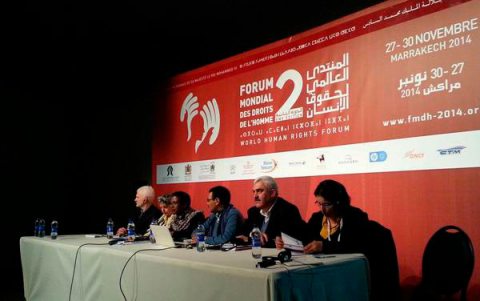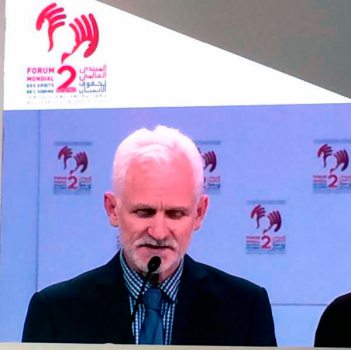Ales Bialiatski: Our strength is in fearlessness and solidarity
The Forum in Marrakech is attended by some eight thousand representatives from five continents, including. The opening conference of the Forum was visited by the Brazilian Secretary for Human Rights Maria do Rosário Nunes, Moroccan Justice Minister Mustafa Ramid, and former Spanish Prime Minister Jose Luis Rodriguez Zapatero.
Speaking to the Forum participants, Ales Bialiatski told of the importance of solidarity of the human rights community worldwide.

“Dear friends!
My name is Ales Bialiatski. I am chairman of the Human Rights Center “Viasna” from Belarus and Vice President of the International Federation for Human Rights, which includes nearly two hundred human rights organizations from around the world.
Belarusian authorities have convicted me for advocacy and I spent in prison almost three years. And I would be still there if it were not for a huge international solidarity, which made the authorities to let me out of jail.
But my case is not unique. On all continents, in different parts of the world, in rich and poor countries, there is a constant struggle for freedom and human rights. It is not stopped for a minute, because there are always people who want to make this world a better place to live in. For his dream, you sometimes have to pay a heavy price.
In my region of the former Soviet countries, human rights activists are having less and less opportunities for work. It is harder and more dangerous to promote human rights. Russia started a war against Ukraine, which resulted in thousands of deaths and millions of refugees. And when weapon speaks – human rights fade in the background.
The situation for human rights defenders in individual countries is particularly tragic.
In Russia, human rights defenders are killed; Belarus throws them in jail or kick out of the country; in Kyrgyzstan, Azimzhan Askarov was sentenced to life imprisonment on false charges; prominent human rights defenders Leyla Yunus, Intigam Aliyev and dozens of their colleagues and journalists are in prison in Azerbaijan; Salijon Abdurahmanov, Dilmurod Sayid and Azam Turgunov among other human rights defenders imprisoned in Uzbekistan. And the list – of victims and heroes in one person – is endless.
Authoritarian dictatorships are openly at war with human rights activists, accusing them of all sins, calling us criminals. Less space remains for the development of society. Law, instead of defending, is often used to limit the rights and freedoms as a means of repression against civil society activists.
Repression against human rights defenders is motivated by a desire to conceal the truth, to get away from everyday problems. We are like a litmus test that shows the level of impunity for power, lack of rule of law, the shortcomings of the judicial system, the level of corruption.
The authorities want to make human rights defenders remain silent. But we are fighting against fear and indifference in the society. We are fighting the causes of human rights violations. We do not want to live in a lie, we are ready to risk much make the truth speak.
A dream to make this world a better place to live is irresistible. The Universal Declaration of Human Rights was adopted almost 70 years ago, in 1948. Then, after the war, half of the world lay in ruins, there was the colonial system, and the Soviet Union and China were ruled by bloody dictatorships. But empires collapse, steadfast regimes fall, and the idea of human rights, important and valuable for all people, seize the whole world.
Our strength, the strength of “the powerless”, this is how the Czech president and human rights activist Vaclav Havel called dissidents and human rights activists, is in fearlessness and solidarity.
Dear friends, let us show solidarity! Let’s stick together! Let’s keep our eyes open! And then it will be easier for us to change the world for the better!”

The 2nd World Human Rights Forum is held in Marrakesh from 27 to 30 November. It brings together heads of states, ministers, representatives of international human rights organizations, activists and media representatives. The Forum organizes workshops and a fair devoted to social and solidarity economy, as well as cultural events. The results of the Forum, which consists of several thematic events, will be presented at the final conference, which is expected to be attended by representatives of the UN human rights system and international human rights organizations. The first Forum was held in Brazil in December 2013. It was attended mainly by representatives of South and Central Americas.




















